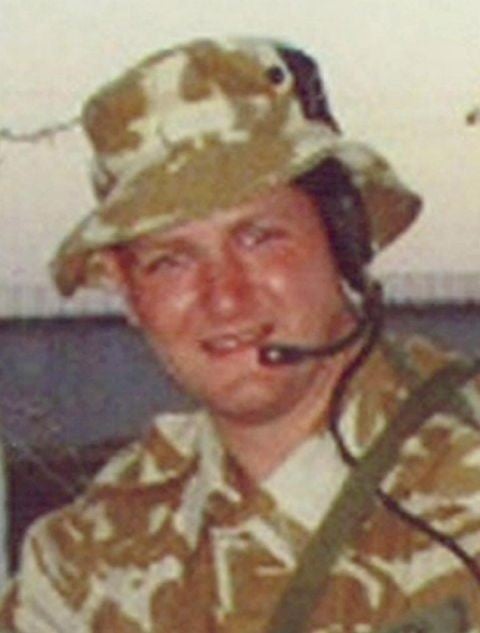Officer close to tears as he tells soldier Jason Smith's inquest of extreme heat
'It was extremely hot, we were extremely busy, too busy, and we didn't have enough resources' says Lt Colonel Stuart Cattermull

Hellish conditions endured by British soldiers in Iraq were revealed during an inquest which opened today into the death of Private Jason Smith, 32, who died of heatstroke in 2003.
Giving evidence at the inquest, in Oxford, the soldier's former commanding officer, Lt Colonel Stuart Cattermull, was close to tears as he spoke about the extreme heat he and his men fought to survive, calling the climate "an adversary".
He broke down as he remembered the battle against the elements: "It was extremely hot, we were extremely busy, too busy, and we didn't have enough resources - be that manpower, be that equipment - to do what we were asked to do." He added: "My best resource available, as ever, were my soldiers, who never let me down."
Pte Smith, a Territorial Army soldier from Hawick, Scotland, had repeatedly complained feeling ill due to temperatures which soared to more than 50C (122F), after being deployed in June 2003.
He reported sick in August, and on the 13th of that month was found lying face down at the old athletics stadium where he was stationed with 1st Battalion, the King's Own Scottish Borderers, and was taken to hospital. He had suffered a cardiac arrest and was pronounced dead.
Pte Smith was part of a small company expected to keep the city of Al Amarah "from falling into anarchy" and the heat was a serious threat. "The environment was the hardest that I have experienced in my military career," said Lt Col Cattermull.
The senior officer described "extreme" temperatures which became worse as the tour went on, reaching more than 50C during the day and falling to the high 30s in the evening. "I remember frying an egg on a Land-Rover."
Drivers of Saxon armoured vehicles had to be "semi-naked," with soldiers pouring water on them, so they could cope with the heat and focus on driving, he added.
Official army guidance on coping with the heat, on a 'yellow card' issued to soldiers, was wrong, he said. "Five litres was not an adequate amount of water." The guidelines were "written for Salisbury Plain, not Al Amarah," he said.
The heat was so extreme that soldiers would not wear body armour at times - the risk of succumbing to heatstroke deemed more serious than that of being shot.
There was no mains electricity, no running water, and no air conditioning where the soldiers were based, and they were allowed just one shower in the morning and another at night "because that was all the water we could give them," Lt Col Cattermull admitted.
Despite the obvious need for keeping men hydrated, Dioralyte was in such short supply that one of his officers had to get his mother to send some.
And they only had one trained medic, which was "insufficient."
The officer said that Pte Smith's death came in the context of "relentless tempo of operations, stretched manpower and extreme heat".
He insisted that he understood "heat was a risk" and that they did "everything practicable to mitigate" against it.
Soldiers were put on 'forced drinking' parades before and after patrols, but it took weeks for air conditioning units, which had been requested "very early on", to arrive. They finally turned up two days after Private Smith died of heatstroke on 13 August.
The soldiers were operating in a "hot, dusty hellhole," according to written evidence from Sergeant Joseph Holmes.
Alison Thompson, assistant coroner, commented: "For everybody involved it will be very hard looking at these events ten years later." Turning to Pte Smith's mother Catherine, she said: "Mrs Smith, it is so tough on you to be here once again at a court of law, having to hear this again."
It has been a long journey for Mrs Smith, who had to wait three years before an inquest was held in 2006. The MoD behaved "as more interested in a PR exercise and covering their backs than being open and honest," she claimed. "I firmly believe that information was deliberately withheld from not only myself but also the Coroner." Mrs Smith had to fight a legal battle to get a second inquest into her son's death after it emerged that the Ministry of Defence had failed to disclose a Board of Inquiry report during the original inquest. And after a judicial review, the Supreme Court ordered another inquest in 2010 into Private Smith's death.
The new inquest, which is expected to last all week, will hear from at least a dozen witnesses and a further 17 written witness statements will be summarised.
Reaching this point has been "long and painful" and "no one should ever have to battle in the way that I have for the truth about Jason's death," said Mrs Smith.
Her son is one of six British soldiers to have died of heatstroke during the past decade. During this time, more than 1,300 soldiers serving in Iraq and Afghanistan have been hospitalised due to heat illness.
And the MoD is at the centre of a police investigation after the deaths of three soldiers from heatstroke during a training exercise in the Brecon Beacons this summer.
Subscribe to Independent Premium to bookmark this article
Want to bookmark your favourite articles and stories to read or reference later? Start your Independent Premium subscription today.

Join our commenting forum
Join thought-provoking conversations, follow other Independent readers and see their replies